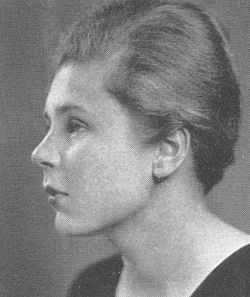Elizabeth Bishop Quote
Questions of TravelThere are too many waterfalls here; the crowded streamshurry too rapidly down to the sea,and the pressure of so many clouds on the mountaintopsmakes them spill over the sides in soft slow-motion,turning to waterfalls under our very eyes.—For if those streaks, those mile-long, shiny, tearstains,aren't waterfalls yet,in a quick age or so, as ages go here,they probably will be.But if the streams and clouds keep travelling, travelling,the mountains look like the hulls of capsized ships,slime-hung and barnacled.Think of the long trip home.Should we have stayed at home and thought of here?Where should we be today?Is it right to be watching strangers in a playin this strangest of theatres?What childishness is it that while there's a breath of lifein our bodies, we are determined to rushto see the sun the other way around?The tiniest green hummingbird in the world?To stare at some inexplicable old stonework,inexplicable and impenetrable,at any view,instantly seen and always, always delightful?Oh, must we dream our dreamsand have them, too?And have we roomfor one more folded sunset, still quite warm?But surely it would have been a pitynot to have seen the trees along this road,really exaggerated in their beauty,not to have seen them gesturinglike noble pantomimists, robed in pink.—Not to have had to stop for gas and heardthe sad, two-noted, wooden tuneof disparate wooden clogscarelessly clacking overa grease-stained filling-station floor.(In another country the clogs would all be tested.Each pair there would have identical pitch.)—A pity not to have heardthe other, less primitive music of the fat brown birdwho sings above the broken gasoline pumpin a bamboo church of Jesuit baroque:three towers, five silver crosses.—Yes, a pity not to have pondered,blurredly and inconclusively,on what connection can exist for centuriesbetween the crudest wooden footwearand, careful and finicky,the whittled fantasies of wooden cages.—Never to have studied history inthe weak calligraphy of songbirds' cages.—And never to have had to listen to rainso much like politicians' speeches:two hour of unrelenting oratoryand then a sudden golden silencein which the traveller takes a notebook, writes:Is it lack of imagination that makes us cometo imagined places, not just stay at home?Or could Pascal have been entirely rightabout just sitting quietly in one's room?Continent, city, country, society:the choice is never wide and never free.And here, or there...No. Should we have stayed at home,wherever that may be?
Questions of TravelThere are too many waterfalls here; the crowded streamshurry too rapidly down to the sea,and the pressure of so many clouds on the mountaintopsmakes them spill over the sides in soft slow-motion,turning to waterfalls under our very eyes.—For if those streaks, those mile-long, shiny, tearstains,aren't waterfalls yet,in a quick age or so, as ages go here,they probably will be.But if the streams and clouds keep travelling, travelling,the mountains look like the hulls of capsized ships,slime-hung and barnacled.Think of the long trip home.Should we have stayed at home and thought of here?Where should we be today?Is it right to be watching strangers in a playin this strangest of theatres?What childishness is it that while there's a breath of lifein our bodies, we are determined to rushto see the sun the other way around?The tiniest green hummingbird in the world?To stare at some inexplicable old stonework,inexplicable and impenetrable,at any view,instantly seen and always, always delightful?Oh, must we dream our dreamsand have them, too?And have we roomfor one more folded sunset, still quite warm?But surely it would have been a pitynot to have seen the trees along this road,really exaggerated in their beauty,not to have seen them gesturinglike noble pantomimists, robed in pink.—Not to have had to stop for gas and heardthe sad, two-noted, wooden tuneof disparate wooden clogscarelessly clacking overa grease-stained filling-station floor.(In another country the clogs would all be tested.Each pair there would have identical pitch.)—A pity not to have heardthe other, less primitive music of the fat brown birdwho sings above the broken gasoline pumpin a bamboo church of Jesuit baroque:three towers, five silver crosses.—Yes, a pity not to have pondered,blurredly and inconclusively,on what connection can exist for centuriesbetween the crudest wooden footwearand, careful and finicky,the whittled fantasies of wooden cages.—Never to have studied history inthe weak calligraphy of songbirds' cages.—And never to have had to listen to rainso much like politicians' speeches:two hour of unrelenting oratoryand then a sudden golden silencein which the traveller takes a notebook, writes:Is it lack of imagination that makes us cometo imagined places, not just stay at home?Or could Pascal have been entirely rightabout just sitting quietly in one's room?Continent, city, country, society:the choice is never wide and never free.And here, or there...No. Should we have stayed at home,wherever that may be?
Related Quotes
People lack morals, good moral character is important in every aspect of your life. Honesty and Integrity opens the door. Your character allows others to see you for who you truly are. Make your first...
About Elizabeth Bishop
